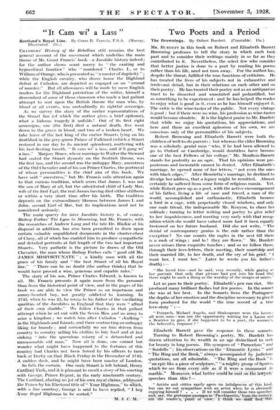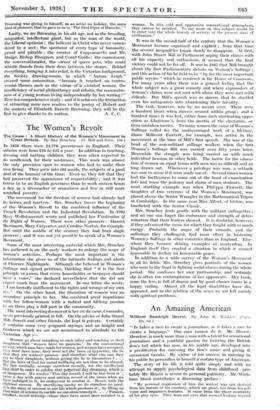The Brownings. By Osbert Burdett. (Constable - : 158.) Ma. BuanErr in
this book on Robert and Elizabeth Barrett Browning professes to tell the story in which each took part and to consider their writings mainly in so far as they
contributed to it. Nevertheless, the select few who consider that better justice is done to a poet by reading his poems rather than his life, need not turn away: For the author has, despite the threat, fulfilled the true functions of criticism. He has treated the lives of his subjects not in exhaustive and irrelevant detail, but in their relations on each other and on their poetry. He has treated their poetry not as an antiquarian tract to be dissected and annotated and pedantified, but as something to be experienced : and he has helped the reader to enjoy what is good, in it, even as he has himself enjoyed it. The critic is the wine-taster of the public. Not every vintage is good ; but if there were no wine, his profession as wine-taster would become obsolete, It is the highest praise to Mr. Burdett that while we enjoy his quotations, his appreciations, and here and there an excellent aphorism of his own, we are conscious only of the personalities of his subjects.
Robert Browning and Elizabeth Barrett were both the children of well-to-do parents ; but whereas the elder Browning was a scholarly, genial man "who, if he had been allowed to go to Oxford or. Cambridge,. would doubtless have become one of the best Fellows of his college," Mr. Moulton-Barrett stands for posterity as an ogre. That his opinions were pre- posterous and inexorable cannot be denied. After Elizabeth's marriage, lie opened none of her letters, " not even the ones with black edges." After Henrietta's marriage, he declined to divulge her address, that a legacy Might be remitted. Almost certainly he suffered from some form of religious mania. Yet, while Robert grew up as a poet, with the active encouragement of his father, living a life of ease and travel, a man of the world, accomplished and enthusiastic, Elizabeth became a bird in a cage, with perpetually closed windows, and only one male friend, the indispensable Mr. Kenyon, to cheer her solitude ; turning to letter writing and poetry _to_ give relief to her impulsiveness, and meeting very early with that recog- nition which she would have valued more had it been equally bestowed on her future husband. Did she not write, " The denial of contemporary genius is the_ rule lather than the exception ? No one counts the eagles in the nest till there is a rush of wings ; and lo ! they are flown." Mr. Burdett never misses these exquisite -touches ; and -so we follow them, through their love-letters, their meeting, their courtship and their married life, to her death, and the cry of his grief, " I want her, I want her." Later he wrote .(on his father's death)
She loved him—and he said, very recently, while gazing at her portrait that only that picture-had put into his head that there might be such a thing as the worship of the images of saints."
Let us pass to their poetry: _ Elizabeth's pen ran riot. She produced many brilliant flashes but few poems. In the sonnet she was at her best. -In the Sonnets from the Portuguese the depths of her emotion and the discipline necessary to give it
form produced for the world " the true record of a true love-story " " Petraseh, Michael Angelo, and Shakespeare were, the lovers : all were men—was not the opportunity waiting for a Laura and a Beatrice to give, if she happened to be a poet, the woman's, the beloved's, response ? "
.
Elizabeth Barrett gave the response in these sonnets.
Turning to Robert Brownings poetry, Mr. Burdett has drawn attention to its. wealth in an age disinclined to seek
for beauty in long poems. His synopses of " Paraeelsus " and Sordello "; his observations on the. Dramatic' Lyrics " and
"The Ring and the Book," always gy judicious quotations, are all admirable. • " The Ring and the Book " is "an epic like a piece of sculpture," "a mighty group of figures, _which we see from every side as a it were a monument in marble." Moreover, what betier could be said oh`the lawyers' speeches than this ?- " ..9.rtielts and critics -Misty- agree an indulgences of this kin4, but can we not sympathise with an artist when he is obviously enjoying himself ? . . . If we will consider these two speeches, and, say, the grotesque passages in Paechierotto,' from the wrAlt
' *the reader's, 'paint of view': 1 "think-we- alitd1--Ent Browning was giving to himself, as an artist on holiday, the same kind of pleasure, that he gave to us in ' The Pied Piper of Hamelin.' "
Lastly, we See brOwning, in his old age, not as the brooding, misguided, intellectual giant, but as the man of the world, the Liberal Optimist ; the believer in Christ who never surren- dered to a sect ; the spectator of every type of humanity, proud and pitiable ; the creator of Capponsacchi and Mr. Sludge, Bishop BlOugram and Count Guido ; the connoisseur, the conversationalist, the owner of queer pets, who could Whistle lizards 'front their dens between the stones. Behind everything, bringing it into relief, is the Victorian background, the Scieiety - thawing-rooms, in which " Aurora - Leigh "I created some " because it touched on -contro-. versial themes such as the virtue of a violated Woman, the ifisufficiency of social philanthropy and reform; the reaSonable-:. tiess of a young woman living independently by her writing !" Here is a comprehensive study ; and if it achieves the distinction of attracting some new readers to the poetry of Robert and the sonnets of Elizabeth Barrett BroWning,, they will be the
first to give thanks to its author. A. C. C. •



















































































































 Previous page
Previous page